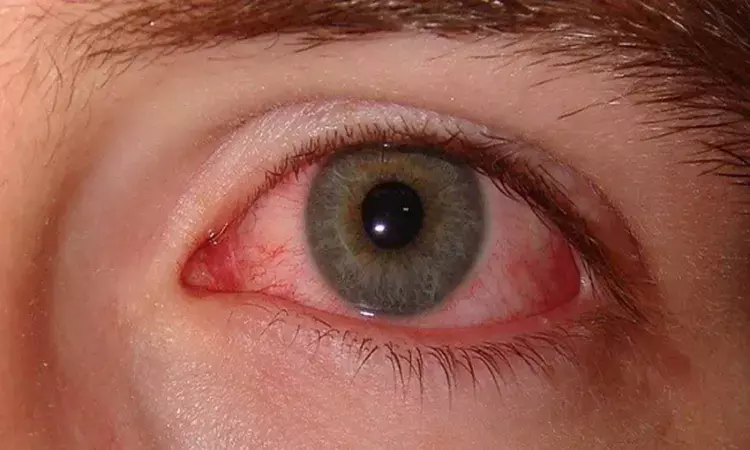- Home
- Medical news & Guidelines
- Anesthesiology
- Cardiology and CTVS
- Critical Care
- Dentistry
- Dermatology
- Diabetes and Endocrinology
- ENT
- Gastroenterology
- Medicine
- Nephrology
- Neurology
- Obstretics-Gynaecology
- Oncology
- Ophthalmology
- Orthopaedics
- Pediatrics-Neonatology
- Psychiatry
- Pulmonology
- Radiology
- Surgery
- Urology
- Laboratory Medicine
- Diet
- Nursing
- Paramedical
- Physiotherapy
- Health news
- Fact Check
- Bone Health Fact Check
- Brain Health Fact Check
- Cancer Related Fact Check
- Child Care Fact Check
- Dental and oral health fact check
- Diabetes and metabolic health fact check
- Diet and Nutrition Fact Check
- Eye and ENT Care Fact Check
- Fitness fact check
- Gut health fact check
- Heart health fact check
- Kidney health fact check
- Medical education fact check
- Men's health fact check
- Respiratory fact check
- Skin and hair care fact check
- Vaccine and Immunization fact check
- Women's health fact check
- AYUSH
- State News
- Andaman and Nicobar Islands
- Andhra Pradesh
- Arunachal Pradesh
- Assam
- Bihar
- Chandigarh
- Chattisgarh
- Dadra and Nagar Haveli
- Daman and Diu
- Delhi
- Goa
- Gujarat
- Haryana
- Himachal Pradesh
- Jammu & Kashmir
- Jharkhand
- Karnataka
- Kerala
- Ladakh
- Lakshadweep
- Madhya Pradesh
- Maharashtra
- Manipur
- Meghalaya
- Mizoram
- Nagaland
- Odisha
- Puducherry
- Punjab
- Rajasthan
- Sikkim
- Tamil Nadu
- Telangana
- Tripura
- Uttar Pradesh
- Uttrakhand
- West Bengal
- Medical Education
- Industry
Acupuncture effective for treating dry eye after refractive surgery: Study

Korea: In patients who have undergone a refractive surgery, acupuncture treatment in addition to usual care, seems to be a feasible treatment for dry eye syndrome, according to results from a pilot study published in the journal Integrative Medicine Research.
"A full-scale RCT is required to confirm the clinical effectiveness of acupuncture," wrote the authors.
Dry eye syndrome (DES) is the most common complication of refractive surgery. Acupuncture is used widely for the treatment of ophthalmologic diseases but only a few studies have explored its effects for treatment of DES following refractive surgery. Sanghun Lee, Campus of Korea Institute of Oriental Medicine, Daejeon, Republic of Korea, and colleagues, therefore, aimed to assess the feasibility of a study design for evaluating the effectiveness of acupuncture treatment along with usual care compared with usual care only for dry eye syndrome after refractive surgery.
For the purpose, a total of 18 patients with dry eye disease after refractive surgery were included in the study. For 4 weeks, the acupuncture plus usual care and usual care only groups received treatment three times a week
A series of assessments, namely the ocular surface disease index (OSDI), visual analog scale for ocular discomfort, quality of life, tear film break-up time, Schirmer 1 test, and fluorescein-stained corneal-surface photography, along with other general assessments were carried out.
Key findings of the study include:
- Although preliminary, changes in OSDI from the baseline values were significantly different between the two groups at week 5.
- There was a significant difference in the trends of OSDI changes between the acupuncture plus usual care and the usual care only groups.
- No serious adverse events were reported during the study.
"Four weeks of acupuncture treatment in addition to usual care is a feasible treatment for dry eye syndrome after refractive surgery," concluded the authors. "A full-scale randomized controlled trial is needed to confirm the clinical effectiveness of acupuncture."
Reference:
The study titled, "Acupuncture for dry eye syndrome after refractive surgery: A randomized controlled pilot trial," is published in the journal Integrative Medicine Research.
DOI: https://www.sciencedirect.com/science/article/pii/S2213422020300883
Dr Kamal Kant Kohli-MBBS, DTCD- a chest specialist with more than 30 years of practice and a flair for writing clinical articles, Dr Kamal Kant Kohli joined Medical Dialogues as a Chief Editor of Medical News. Besides writing articles, as an editor, he proofreads and verifies all the medical content published on Medical Dialogues including those coming from journals, studies,medical conferences,guidelines etc. Email: drkohli@medicaldialogues.in. Contact no. 011-43720751


